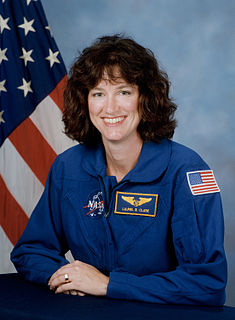A Quote by Barry Commoner
Science is triumphant with far-ranging success, but its triumph is somehow clouded by growing difficulties in providing for the simple necessities of human life on earth.
Related Quotes
There is no other species on Earth that does science. It is, so far, entirely a human invention, evolved by natural selection in the cerebral cortex for one simple reason: it works. It is not perfect. It can be misused. It is only a tool. But it is by far the best tool we have, self-correcting, ongoing, applicable to everything.
Evolution isn't just a story about where we came from. It's an epic at the center of life itself. Far from robbing our lives of meaning, it instills an appreciation for the beautiful, enduring, and ultimately triumphant fabric of life that covers our planet. Understanding that doesn't demean human life - it enhances it.
For life affords no higher pleasure, than that of surmounting difficulties, passing from one step of success to another, forming new wishes and seeing them gratified. He that labours in any great or laudable undertaking, has his fatigues first supported by hope, and afterwards rewarded by joy... To strive with difficulties, and to conquer them, is the highest human felicity.
In work we act under the predominant motive of external, rational necessities; in pleasure, under the predominant motive of other, equally general necessities of human nature. Rest or recreation is the element in which the personality seeks to renew its strength from these stimuli that exhaust the reserve of human resources. It's an element introduced into life by the person himself.
Science has an uncomfortable way of pushing human beings from center stage. In our prescientific stories, humans began as the focal point of Nature, living on an Earth that was the center of the universe. As the origins of the Earth and of mankind were investigated more carefully, it became clear that Nature had other interests beyond people, and the Earth was less central than previously hoped. Humankind was just one branch of the great family of life, and the Earth is a smallish planet orbiting an unexceptional sun quite far out on one arm of a run-of-the-mill spiral galaxy.
Architecture is the triumph of human imagination over materials, methods, and men, to put man into possession of his own Earth. It is at least the geometric pattern of things, of life, of the human and social world. It is at best that magic framework of reality that we sometimes touch upon when we use the word order.
Books proliferate, and occasionally sell in very large numbers, which claim to have found the rule, or small set of rules, which will guarantee business success. But business is far too complicated, far too difficult an activity to distil into a few simple commands ... It is failure rather than success which is the distinguishing feature of corporate life.
I literally wrote a book on it called Your Roadmap For Success. And in it I said success is three things: knowing my purpose in life, I think it's impossible for anybody to be successful until they really discover why they're here on earth and what God has planned for them; secondly, growing to my maximum potential.
Science talks about very simple things, and asks hard questions about them. As soon as things become too complex, science can't deal with them... But it's a complicated matter: Science studies what's at the edge of understanding, and what's at the edge of understanding is usually fairly simple. And it rarely reaches human affairs. Human affairs are way too complicated.
... we have almost succeeded in leveling all human activities to the common denominator of securing the necessities of life and providing for their bundance. Whatever we do, we are supposed to do for the sake of "making a living;" such is the verdict of society, and the number of people, especially in the professions who might challenge it, has decreased rapidly. The only exception society is willing to grant is to the artist, who, strictly speaking, is the only "worker" left in a laboring society.



































